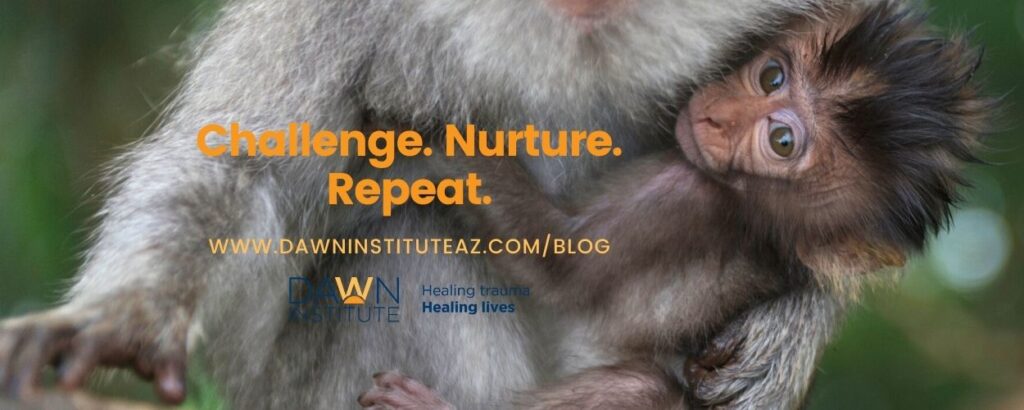Several years ago, I was walking through the primate exhibit at the zoo when a baby monkey caught my eye. If you ever want to get my attention quickly, put a baby anything within my view and I will be captivated. So, there I was oooing and aaaaing over this cute little animal. As I was watching the baby monkey, I couldn’t help but notice something happening between the mother monkey and the baby. Let me see if I can paint this picture.
At initial glance, they mother and infant were cozied up together with the baby clinging to the mother. Then, the mother pried the baby off her chest and abruptly placed the baby on the chain-link enclosure… and she climbed a distance away on the enclosure fencing. This seemed odd. The baby slowly makes its way over to the mother, with it still-developing, wobbly hands and legs. As soon as the baby reached the mother, it would start to nurse. And within seconds the mother would just climb away leaving the baby without that oh-so-soothing breast to nurse on. Baby would make its ways over and nurse. Mother would leave within seconds. Repeat cycle.
Momma monkey’s a skilled parent.
Funny, though. The next time I went to the same enclosure, zookeepers had posted a sign stating that this mother had raised several other infants successfully to adulthood and knew how to parent her babies. I can’t help but wonder if people had expressed concerned over her parenting strategies. I have to admit I was quite impressed by them.
You see, this mother monkey was using quite a skilled parenting strategy: Challenge. Nurture. Repeat. She challenged her infant and was immediately there to support with nurture. This cycle of challenge and nurture was repeated over and over. Could you imagine if she had not done this? Her infant would have been impaired in climbing at minimum. This sweet, baby monkey needed challenge to learn. It needed challenge to know that it was capable. It needed challenge for development of motor skills. And every time it was offered challenge, this was paired with nurturance.
What we can learn from momma monkey.
There is so much we can learn from this as parents because we run the risk of offering challenge without nurturance or offering nurturance without the challenge. Let’s take a look at both.
Challenge without soothing.
Children learn to soothe themselves by first being soothed by us, which begins at birth. An infant cries and we soothe. Our toddler falls and we comfort. Children argue with their friends, and we hug them. Over time, they learn, “Hey, I can actually be soothed!” Eventually this will translate into them self-soothing around 12 or 13 years old. When we offer challenge without soothing, our children do not learn these things about themselves. They learn to be overwhelmed, which will translate into big emotional responses or inhibited emotional responses, both of which can have long-term consequences. In this case children learn, “Life is too overwhelming, and I am not able to be soothed.”
Soothing without challenge.
On the other end of spectrum, children are offered nurturance without challenge. Children need challenge, especially in a culture where we have so many “time saving” devices. The expense of this is a smaller level of challenge for our kiddos in daily life. They don’t need to challenge their minds to solve problems because they have calculators at their fingertips. Handwashing dishes and the eye for detail is not needed. Hauling large loads to the barn prevents them from using large muscles. This is a great challenge we encounter as parents. When children do not have enough challenge, they learn “I am not capable” or “challenge equals anxiety.” I have seen a large increase of teens with high levels of anxiety… I can’t help but wonder if this is in part caused by a lack of challenge in our teens. Just a thought.
What can we do as parents? Challenge. Nurture. Repeat.
Sometimes it feels as though we are invalidating your kiddos when we offer them challenge. Sometimes if feels like we are handing them life on a silver platter when we nurture. The goal is balance. When they come to us in distress, we can offer them validation and affection. This is actually necessary to their well-being, but that does not mean we have to take away the challenge.
I’ve heard parents say, “But when they feel anxious and I make them go to school still, I feel like I am invalidating them.” Validation means we acknowledge that it is hard and nurture their distress. The challenge though is still vital to their well-being. Sometimes, they still need to go to school… repair a rupture with their friends… finish their chores… find a job. We can go on and on.
We can build resilience for our children by offering them a balance of nurturance and challenge. In a way, when we do this we give our kiddos the gift of resilience.
So, next time your child comes to you with big emotions, you can validate their emotional experience. You can nurture them. And you can still offer them challenge.
Challenge. Nurture. Repeat.

